Special Inter view
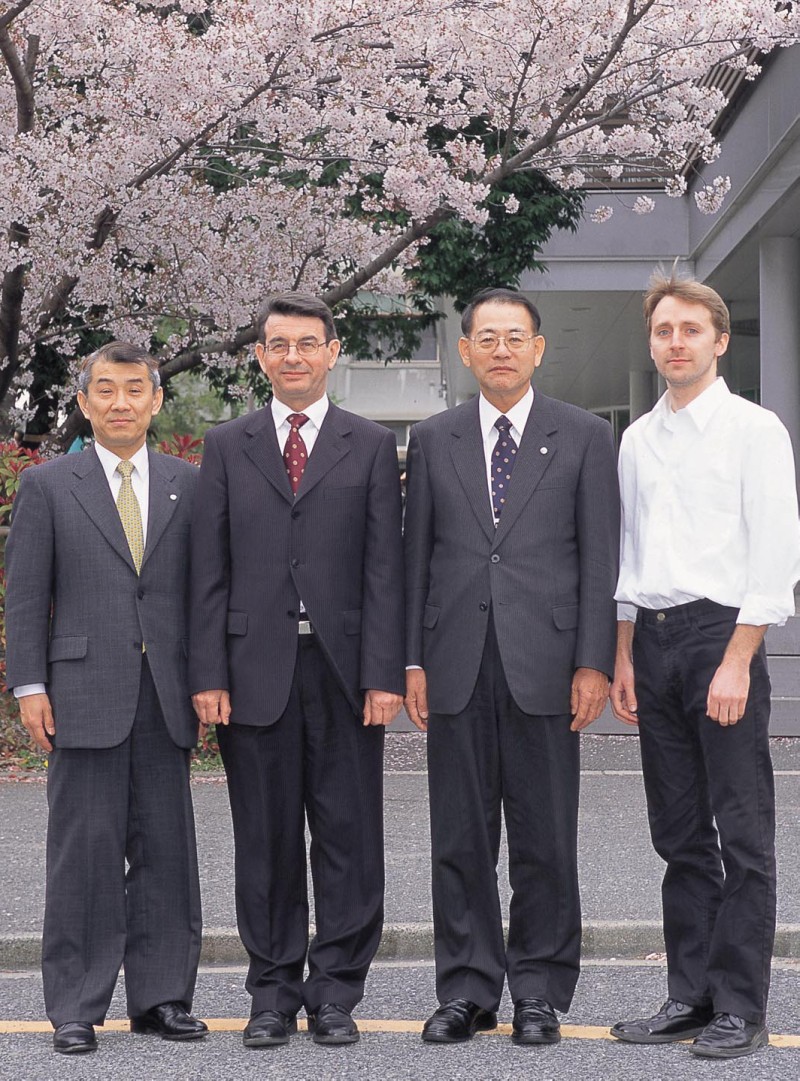 |
| From left: Mr. Yanagihara, Trustee, Kyushu University; Mr. Chasseau, Vice President, University of Bordeaux 1; Mr. Kajiyama, President, Kyushu Univers ity, Mr. Fujie, translator, Graduate School of Sciences special research student. The photo was taken under the cherry trees on Hakozaki Campus. |
| Daniel Chasseau |
| Vice President, University of Bordeaux |
| Tisato Kajiyama |
| President, Kyushu University |
| Facilitator |
| Masaharu Yanagihara |
| Trustee, Kyushu University |
On April 6, 2006, Vice President Daniel Chasseau, University of Bordeaux 1, which is our oldest exchange partner, attended Kyushu University's entrance ceremony for the 2006 school year as a guest and delivered a congratulatory speech to the freshmen. In 1981, Kyushu University concluded its first academic exchange agreement with Bordeaux 1 University and since then the two universities have promoted exchange over the last quarter century. The agreement was revised in 2005, and a cooperative symposium will be held in France this year, broadening our interaction. Vice President Chasseau and President Kajiyama discussed the exchange between the two universities, including the expectations for the symposium.
Ties between Kyushu University and Bordeaux University over the last quarter century
KAJIYAMA: Thank you very much for attending Kyushu University's entrance ceremony today as a representative guest from University of Bordeaux 1. Our freshmen were deeply moved by your congratulatory speech.
YANAGIHARA: I hear that this is your third visit to Fukuoka. What is your impression of Fukuoka?
CHASSEAU: I believe that my first visit was in April two years ago, and I visited Fukuoka as a member of a civic association led by Mr. Alain Juppe, who was the Mayor of Bordeaux at the time. I had an opportunity to speak with Mr. Kajiyama and Mr.Yanagihara, and I recall that we talked about the update of the sister city partnership concluded between Fukuoka City and Bordeaux City in 1981. Back then, I was also with a professor of the Engineering Department and the director of the Architecture Department, and I gave a lecture in the seminar of Professor Irie, who is also a Doctor Honoris Causa at Bordeaux 1 University.
YANAGIHARA: Today, Kyushu University holds exchange agreements with about 80 universities, and our first agreement was concluded with University of Bordeaux. In this regard, University of Bordeaux is a very important partner for Kyushu University. Last year, President Kajiyama visited Bordeaux to update the academic exchange agreements with the four universities and three "grandes ecoles" (higher professional schools equivalent to graduate school) in Bordeaux. Mr. Kajiyama, will you please tell us what the visit was like?
KAJIYAMA: Unfortunately, we could not see the students as our visit took place in February, but we met many professors in various fields. University of Bordeaux 1, where Mr. Chasseau works at, appeared to be engaged in worldwide research. One of my students is still studying at the university, and it was a great visit.
YANAGIHARA: I myself attended a signing ceremony last year, and I can still visualize clearly all the top eight faculties from each university gathered at the historical city hall, where the ceremony took place.
KAJIYAMA: Another thing I can recall clearly was that the ceremony was quite busy as eight people had to sign (laughter).
CHASSEAU: The preparation for the signing ceremony was a huge task, too. It is rare that all the presidents of universities in Bordeaux gather in one place. Senator Valade, former French Minister of From left: Mr. Yanagihara, Trustee, Kyushu University; Mr. Chasseau, Vice President, University of Bordeaux 1; Mr. Kajiyama, President, Kyushu University Research attended, too, and it turned out to be an outstanding ceremony.
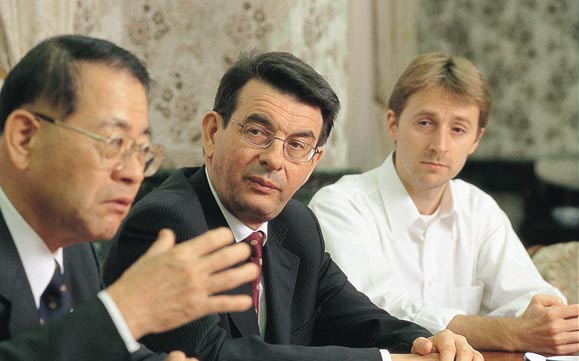
Advanced mutual cooperation among French universities
YANAGIHARA: Next, I would like to ask Mr. Chasseau about the situation of the universities in Bordeaux. I recognize that there are four universities and three grandes ecoles, and I also hear that Bordeaux does not have a consortium (an organization that is created based on agreements to facilitate mutual exchange and joint research) like other cities, and that each institution manages independently.
CHASSEAU: Yes, the current state is that the four universities are independent. However, in the last two years since I have been appointed as Vice President, University of Bordeaux advocated a cooperative framework to link universities called "PRES," and though it is not a consortium, four universities and five grandes ecoles have joined it. There is no legal framework for "PRES," yet but there is a chance that it can develop into a cooperative system like in other cities such as Lyon and Grenoble if the linkage is further advanced.
For example, joint research between universities during the PhD course has become active just as in lifelong learning and international relations. Also, a joint research system between Bordeaux 1 University and Bordeaux 2 University is being built in the field of Biology.
KAJIYAMA: Is there a meeting where all the presidents of the four universities gather?
CHASSEAU: There is a conference of university presidents called CPUB. Also, a conference called CPUA, which includes an university in Pau, a city not too far from Bordeaux, is held. Currently, the President of Bordeaux 2 University serves as the chairman.
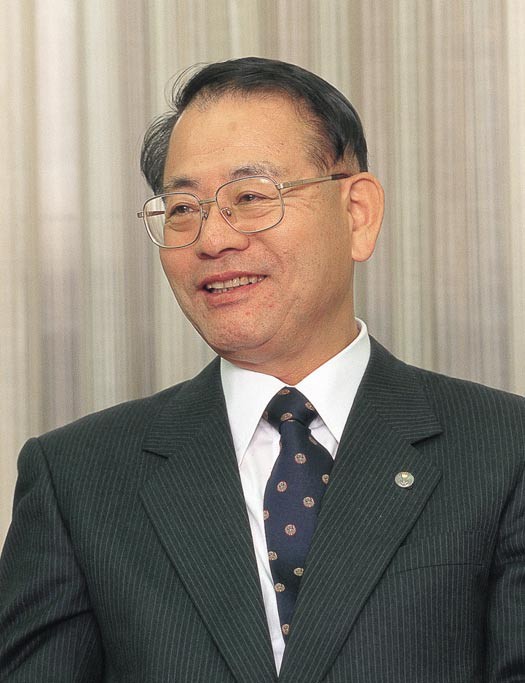
Great expectations on joint symposium
YANAGIHARA: University of Bordeaux and Kyushu University concluded the exchange agreement in 1981, which we updated last year, and it is expected that our partnership will grow stronger in the future. There are various projects that are to be brought into the action, and as one of the projects, a joint symposium in the field of chemistry will be held to coincide with the "Wine Festival" in Bordeaux City at the end of July 2006.
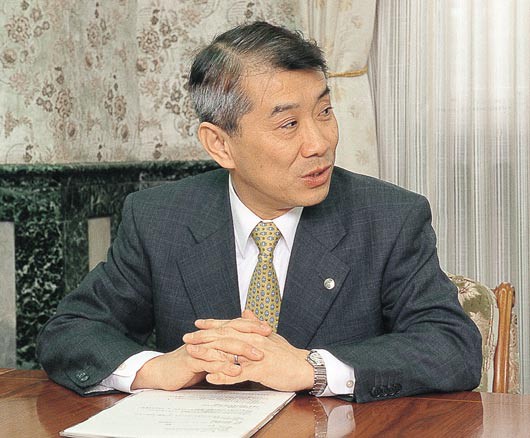
CHASSEAU: An official invitation for the Wine Festival 2006 was handed to the people of Fukuoka from Alain Juppe, Mayor of Bordeaux City at the signing ceremony last year. People of Fukuoka are important guests to our Wine Festival, and I hear that about 100 guests will visit the festival. It is planned that the symposium will be held as a special event on the eve of the festival opening day to symbolize the partnership between Fukuoka and Bordeaux. Especially Chemistry is the field that has created a strong link between Kyushu University and University of Bordeaux. The symposium is going to cover themes on the molecular level and material level. (For details, see pp11-13.)
YANAGIHARA: This symposium is titled "1st Joint Fukuoka-Bordeaux Conference," and I strongly expect that we will continue to hold conferences in the future. I hope that the interaction between the two universities will flourish more in other fields in addition to the joint research in the field of chemistry.
CHASSEAU: I agree with Mr. Yanagihara. I look forward to seeing a new cooperative system between the two universities. Currently, the exchange between master's/PhD students and researchers is active, particularly in the field of chemistry, and I hope to broaden the interaction to other fields of science and technology, architecture, law, literature, etc. I hear that the number of students in these fields who are interested in exchange activities is actually increasing. Tuition and research expenses are required to proceed with research, and it is time-consuming and challenging work to build a global cooperative relationship, which involves overcoming the language barrier and finding an appropriate research facility for individual students. I heard that some students will come to study at Kyushu University from Bordeaux 4 University. I wish the freshmen I saw today at the entrance ceremony good luck, and I hope to see them in Bordeaux someday.
Future interaction -Building a sustainable system
KAJIYAMA: Mr. Fujie is one of the students who came from France and is studying at Kyushu University. What is your research subject?
Fujie: I study pattern formation in the field of mathematical biology. The current focus of my study is on the pattern of leaf veins. I study about the connection between molecules, which helps us to understand phenomena. For example, when the same molecule forms a polymer, completely different outcomes can be observed; starch supplies energy to humans as food while cellulose does not. These study results are also applied to the prehuman experimentation research for drug development, where a virtual model is created beforehand YANAGIHARA: Good luck on your study. Before asking for the last word from Mr. Chasseau, Mr. Kajiyama, please give us a word. KAJIYAMA: The most important point of an exchange agreement between universities is what we actually and materially do. The symposium will be very stimulating for both faculties and students. In the polymer molecule field, which is my specialty, we have been promoting exchange between Pusan in Korea and Kyushu for many years.... The program period is only three days, but it has been implemented every two years, which now counts 16 times and exchanges 50 people including students. By continuing, we can deepen exchange. It is important to continue. I would like to build a sustainable exchange system between Bordeaux and Fukuoka over 10 years and 20 years like the case with Pusan, in which we can exchange about 20 students for a short program period that enables exchange of students with little financial burden. YANAGIHARA: Lastly, Mr. Chasseau, please give a message to the students and young researchers at Kyushu University. CHASSEAU: Recently, a new president was appointed at University of Bordeaux 1, and he is a scholar specializing in biology and is also interested in Minamata disease. He is also very much in favor of the creation of a cooperative system. I would also like to put as much effort as possible to promote the exchange between the two universities. What I would like to tell the students is that there is a framework for international exchange and opportunities to study through such a framework. So please be motivated and work hard, study the language and culture. In these processes, you can find the research field and research group you are actually interested in. Living in a foreign country is a significant experience for a successful career, but it also is a meaningful experience for your personal life. Many students have come to study with us, and we will keep welcoming internationally minded students. YANAGIHARA: Thank you very much. |
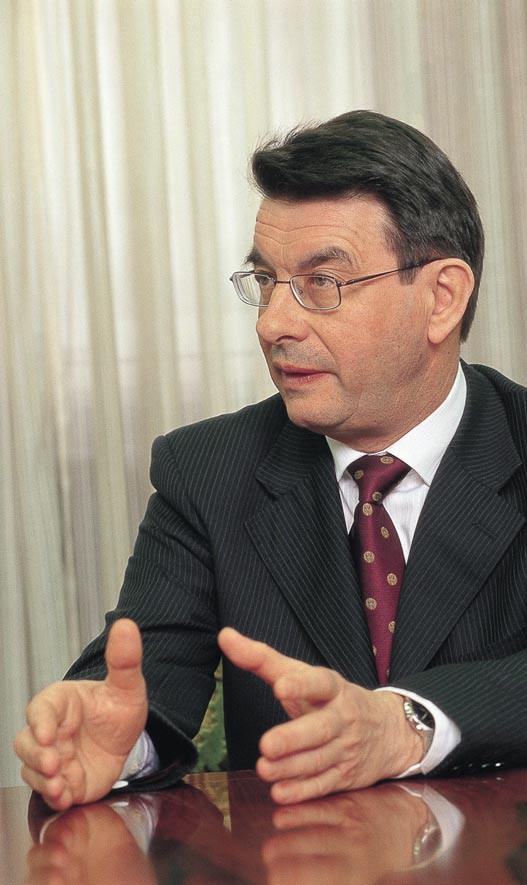 |
| Daniel Chasseau | ||
| 1/9/2003 | Vice-President of European and International Affairs, University of Bor deaux 1 | |
| 1/10/1997 | First Class Professor, University of Bordeaux 1 | |
| 1/10/1989 | Professor in Physics, University of Bordeaux 1 | |
| 27/6/1979 | Docteur d'Etat in Physics, University of Bordeaux 1 | |
| 1/10/1969 | Associate Professor, University of Bordeaux 1 | |